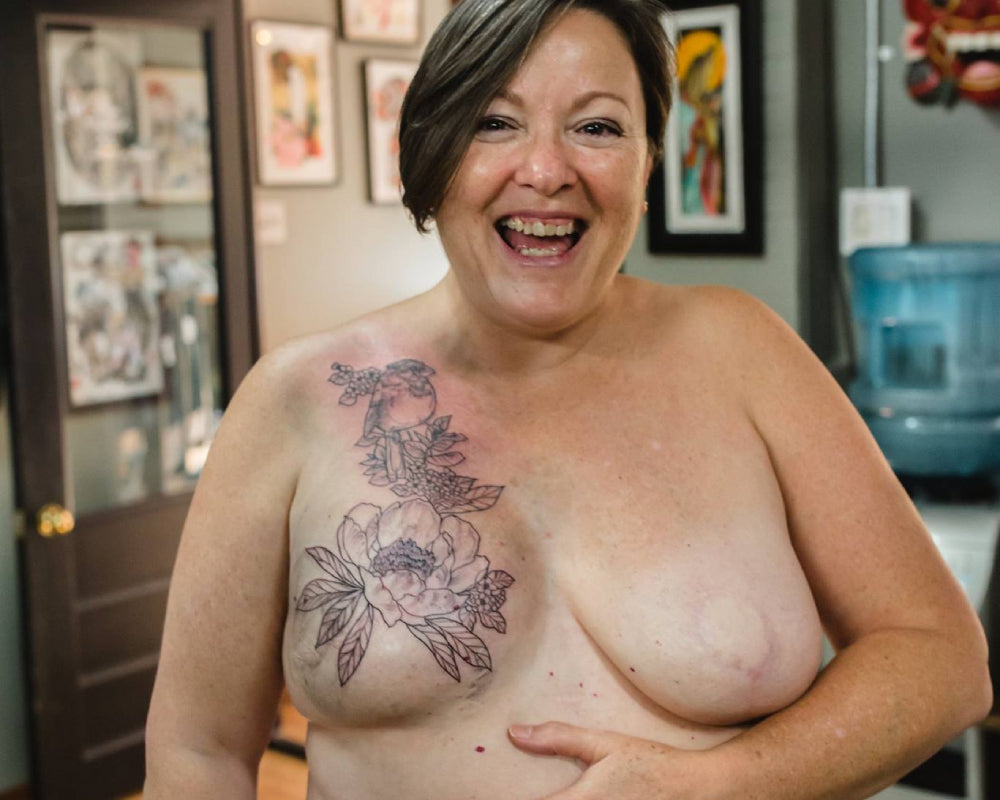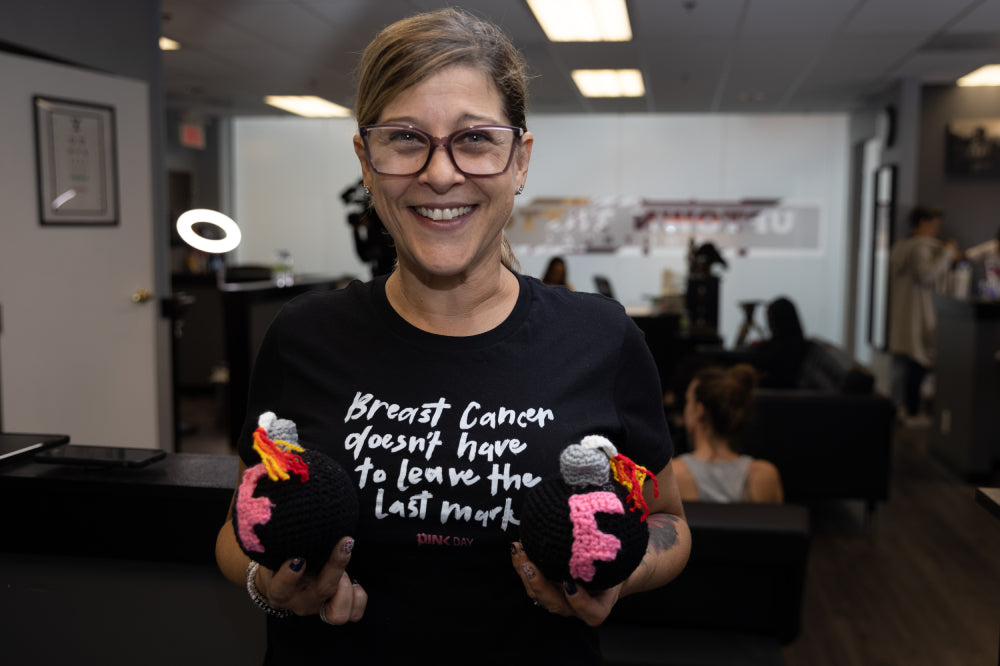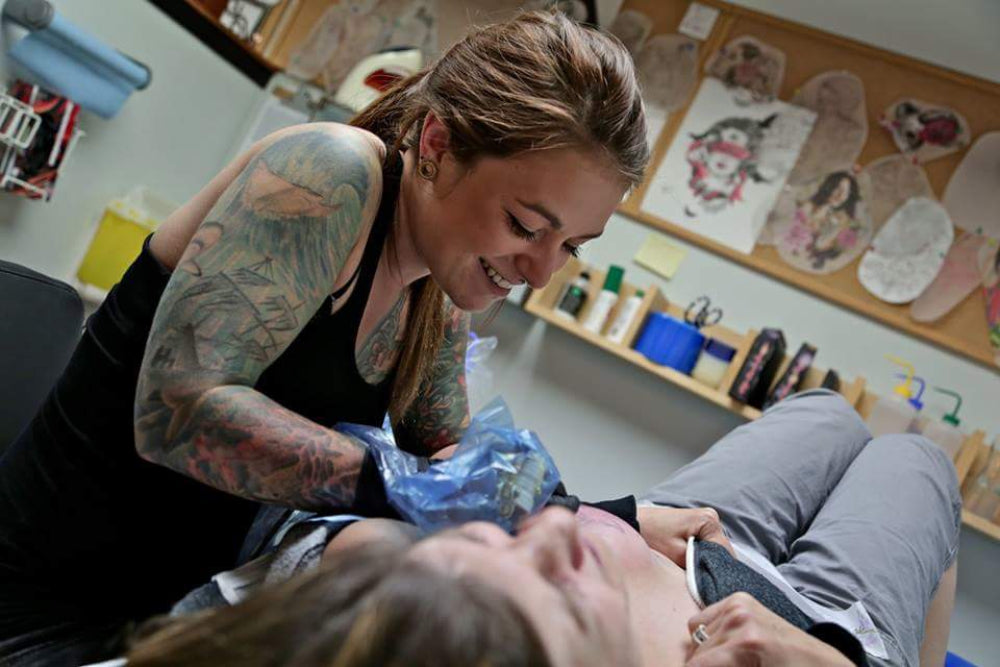The Previvor Facilitating Free Mastectomy Tattoos for Breast Cancer Survivors
In honor of Breast Cancer Awareness Month, The Healing Diaries is an ongoing series focused on post-surgery healing journeys, the stories behind scars, and who survivors are beyond their diagnoses.
—
Karen Malkin Lazarovitz was 34 when she discovered she carried a BRCA gene mutation, a harmful and hereditary DNA variation that put her at increased risk for breast and ovarian cancer.
Prompted by her father to get tested after multiple family cancer diagnoses, she was told she had an 87% chance of developing breast cancer over the course of her life. She was confronted, suddenly, with the notion that her body was a time bomb.
“I decided to schedule a risk-reducing hysterectomy and ovary removal,” says Karen. “Two months later, I scheduled my double mastectomy with the beginning of reconstruction.” Her decision to undergo preventative surgery was met with skepticism by doctors and friends who insisted she was being “extreme.”
It’s a decision she likens to embarking on a flight when there’s an 87% chance you’ll crash. “Are you staying in your seat?” she says. For her, it was a no-brainer that thrust her into menopause and placed her within the growing community of previvors who have undergone proactive — and potentially live-saving — surgeries.
“I’ve gotten comfortable with that label of being someone who’s been proactive,” she tells me. “I do believe that had I not done anything, I would have died of breast cancer like all the other women in my family.”
Feeling alone after her multiple surgeries, she started a support group on Facebook for others dealing with genetic predispositions to breast and ovarian cancer. 11 years later, the “BRCA Sisterhood” is the largest Facebook support group in the world with over 10,000 members.
Some have been diagnosed with cancer and others have opted for risk-reducing surgeries, like Karen, while some have decided to do surveillance. “There’s no right way to cope,” says Karen. For the first time (but certainly not the last) she had tapped into the power of community and sharing her story. “I became an advocate,” she says.
A few years later, she’d go on to share a viral image of her mastectomy tattoo on the platform — igniting an overwhelmingly positive response and inspiring Karen to take the next step in her advocacy work.
Feeling “complete” post-surgery looks different for everyone, Karen posits. “Everybody has their own way of completing their reconstruction or no reconstruction,” she says. After her own reconstruction surgery, she was told nipples were considered an “aesthetic,” out-of-pocket expense — a rule surely made by a man, she jokes.
After multiple surgeries and complications from her implants, the notion of going under the knife again seemed exhausting. Still, her reconstruction journey didn’t quite feel complete. Curious about what alternatives might exist, she took to Google to see if mastectomy scars could be covered with tattoos.
“I met this lovely tattoo artist named Megan,” she says. “We joked that it was love at first sight.” Megan’s grandmother had been diagnosed with breast cancer and she’d been looking for a way to give back. Together, they worked on a tattoo concept for weeks, exchanging late-night ideas back and forth.
She settled on soft, pastel-hued flowers that “fit” her body and didn’t feel too “harsh.” She didn’t know why at the time, but she knew she only wanted it on one side. “Now I realize, I like seeing where I was and where I’ve gotten,” says Karen.
When she looked in the mirror for the first time, she didn’t even see the un-tattooed side — “all I saw was this beautiful artwork and it made me feel really comfortable.” The feeling of empowerment was intoxicating, it had to be shared.
For the next six years, Karen helmed the Canadian chapter of P.ink, a Colorado-based organization providing free mastectomy tattoos to breast cancer survivors, previvors, and thrivers. She went on to facilitate free mastectomy tattoos for 23 women before deciding she wanted to go even bigger.

“This year I went out on my own and created EMPOWERink,” she says. A subsidiary of Pink in the City, the initiative boasts locations across Canada. “I’m able to provide 24 tattoos this year in three locations because I have the creative leeway to do what I want.”
It’s a labor of love she organizes and facilitates all on her own — whether it's connecting applicants to artists who match their style or curating a memorable event. This month, EMPOWERink’s debut kicks off with a champagne toast at the tattoo parlor before each person is paired off with their respective artist.
The women, who have all been connected beforehand, finally get to meet in person and be “with other women who are about to experience the same thing.” Those who finish up first will often lend support to others who are still being tattooed, offering emotional support and a hand to hold.
Then, comes the grand reveal: the women get to see themselves in the mirror for the first time post-tattoo. The atmosphere swells with empowerment, love, and pride, according to Karen. “The women walk out feeling like a whole new person,” she says. “And the fact that I can play a tiny little part in that selfishly brings me so much joy.”
When dealt a difficult diagnosis, often followed by a tide of strenuous treatments, “you’re just focused on fighting,” says Karen. It’s only once the doctor appointments slow down and the health checkups roll in that you’re able to sit back and take stock of your mental state and physical appearance.
“It’s a mourning process of losing who you once were and what you once looked like,” she says. Often, too, the surgical scars can act as painful reminders of past trauma and the uncertainty of what lies aheads.
Mastectomy tattoos are an opportunity to transform those fears into catharsis. It can be healing — triumphant, even. “When you look in the mirror after your artwork is in place, not only are you seeing something beautiful, but you’re seeing something that you’re 100% in control of,” says Karen.
“They get to make the decisions themselves without a doctor or specialist telling them what’s best for them. They’re in control for the first time.”












